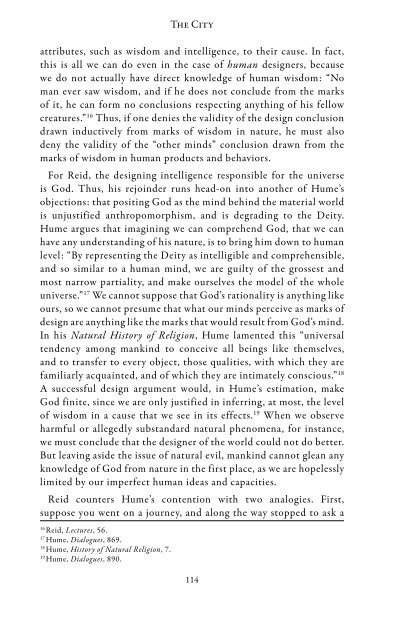THE CITY
h6c7p5d
h6c7p5d
You also want an ePaper? Increase the reach of your titles
YUMPU automatically turns print PDFs into web optimized ePapers that Google loves.
attributes, such as wisdom and intelligence, to their cause. In fact,<br />
this is all we can do even in the case of human designers, because<br />
we do not actually have direct knowledge of human wisdom: “No<br />
man ever saw wisdom, and if he does not conclude from the marks<br />
of it, he can form no conclusions respecting anything of his fellow<br />
creatures.” 16 Thus, if one denies the validity of the design conclusion<br />
drawn inductively from marks of wisdom in nature, he must also<br />
deny the validity of the “other minds” conclusion drawn from the<br />
marks of wisdom in human products and behaviors.<br />
For Reid, the designing intelligence responsible for the universe<br />
is God. Thus, his rejoinder runs head-on into another of Hume’s<br />
objections: that positing God as the mind behind the material world<br />
is unjustified anthropomorphism, and is degrading to the Deity.<br />
Hume argues that imagining we can comprehend God, that we can<br />
have any understanding of his nature, is to bring him down to human<br />
level: “By representing the Deity as intelligible and comprehensible,<br />
and so similar to a human mind, we are guilty of the grossest and<br />
most narrow partiality, and make ourselves the model of the whole<br />
universe.” 17 We cannot suppose that God’s rationality is anything like<br />
ours, so we cannot presume that what our minds perceive as marks of<br />
design are anything like the marks that would result from God’s mind.<br />
In his Natural History of Religion, Hume lamented this “universal<br />
tendency among mankind to conceive all beings like themselves,<br />
and to transfer to every object, those qualities, with which they are<br />
familiarly acquainted, and of which they are intimately conscious.” 18<br />
A successful design argument would, in Hume’s estimation, make<br />
God finite, since we are only justified in inferring, at most, the level<br />
of wisdom in a cause that we see in its effects. 19 When we observe<br />
harmful or allegedly substandard natural phenomena, for instance,<br />
we must conclude that the designer of the world could not do better.<br />
But leaving aside the issue of natural evil, mankind cannot glean any<br />
knowledge of God from nature in the first place, as we are hopelessly<br />
limited by our imperfect human ideas and capacities.<br />
Reid counters Hume’s contention with two analogies. First,<br />
suppose you went on a journey, and along the way stopped to ask a<br />
16<br />
Reid, Lectures, 56.<br />
17<br />
Hume, Dialogues, 869.<br />
18<br />
Hume, History of Natural Religion, 7.<br />
19<br />
Hume, Dialogues, 890.<br />
The City<br />
114


